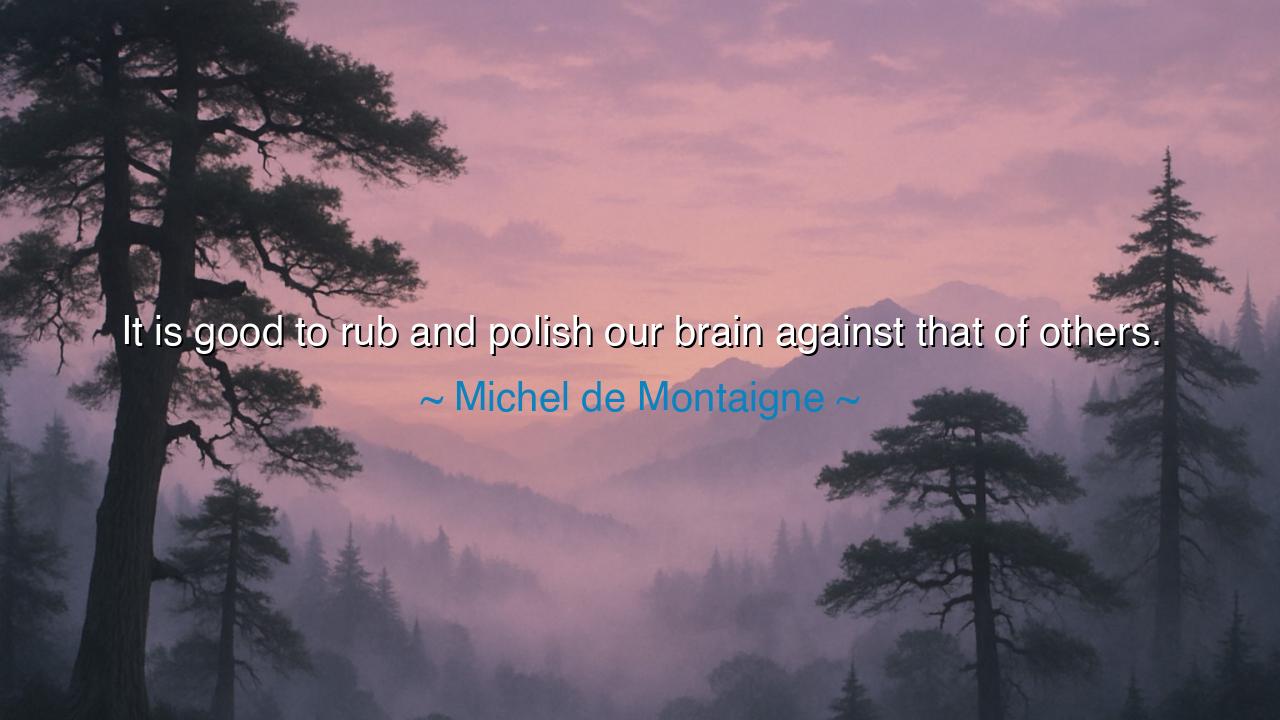
It is good to rub and polish our brain against that of others.






In the golden age of reflection, when men still sought wisdom more than applause, Michel de Montaigne, philosopher of the inward soul, spoke these radiant words: “It is good to rub and polish our brain against that of others.” This saying, born of humility and deep understanding, reveals that knowledge is not a solitary flame but a fire kindled through contact. To rub and polish is to sharpen, to awaken, to refine; for as iron sharpens iron, so too the mind is sharpened by encounter. Montaigne teaches that true wisdom grows not in isolation, but in conversation, in the clash and blending of thoughts between living souls.
The origin of this quote lies in Montaigne’s Essays, a collection of reflections in which he explored the nature of the self and the art of living. Living in the sixteenth century—a time of discovery, upheaval, and philosophical rebirth—Montaigne stood as one of the first to understand that man’s greatest tool is not conquest but communication. He saw that the mind, when left alone, grows dull with its own habits, but when engaged with others, becomes radiant with insight. In a world divided by conflict, he believed the meeting of minds was a form of peace, a sacred dialogue that polished the roughness of ignorance into the smooth surface of wisdom.
To rub and polish our brain is not merely to debate or argue—it is to engage deeply, to listen as well as to speak. Montaigne did not mean the arrogant contest of intellects, but the mutual refinement of understanding. Each conversation, each exchange of ideas, is a sacred labor of growth. When we meet another mind, we encounter not just opinions but worlds—histories, emotions, and experiences that our own life could never contain. Through this meeting, our perspective widens; we learn not only what others know, but who we ourselves are. For the light of truth is rarely seen alone—it glimmers most brightly when reflected through another’s thought.
History offers luminous examples of this truth. Consider the friendship between Socrates and Plato, or the correspondence between Voltaire and Diderot, whose dialogues gave birth to revolutions of thought. Socrates wandered the streets of Athens not to preach but to question, to rub and polish the minds of his fellow citizens, awakening them to self-knowledge. His wisdom lay not in answers, but in the art of shared inquiry. Likewise, in every age, progress has sprung from minds unafraid to be challenged—scientists, poets, and philosophers who dared to collide in the crucible of discussion. The Renaissance itself, of which Montaigne was a child, was born from such friction—each thinker sparking another, until all Europe was aflame with new light.
Yet this truth extends beyond the scholars and sages. In every life, we find the same law at work. The man who avoids disagreement, who surrounds himself only with those who echo his beliefs, remains dull and untested. But the one who seeks out difference—who listens to other voices, even those that oppose his own—becomes strong and tempered like steel. It is through the gentle friction of ideas, through the polishing of our minds against others, that we learn patience, empathy, and depth. To encounter another person’s thought is to be invited into a greater world than one’s own.
There is, however, a warning hidden within Montaigne’s wisdom. Not all friction is fruitful. To polish is not to wound; to rub is not to destroy. Argument born of arrogance dulls both blades, but dialogue born of curiosity refines both souls. The purpose is not to triumph, but to understand. Therefore, approach every conversation as an apprentice of truth, not its owner. Speak with passion but listen with reverence, for the other may hold the missing piece of your understanding.
The lesson, then, is this: seek out minds that challenge you, hearts that differ from your own, and spirits that provoke you to think anew. Avoid the comfort of agreement; embrace the struggle of discovery. When you meet another’s thought, meet it with courage and respect. Let the sparks fly, for in that sacred friction, ignorance is burned away and clarity is born.
So, my children of reflection, remember Montaigne’s eternal counsel: to rub and polish our brain against that of others is the way to wisdom. Do not walk alone in the corridors of thought. Share your mind, offer it to the testing of others, and receive theirs in turn. For it is through this communion—this noble exchange—that humanity advances, that truth emerges, and that the dull stone of the self is transformed into the shining mirror of understanding.






AAdministratorAdministrator
Welcome, honored guests. Please leave a comment, we will respond soon